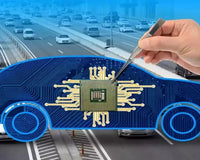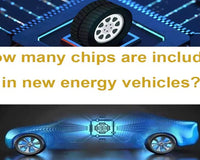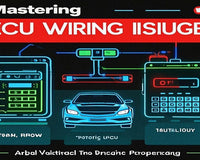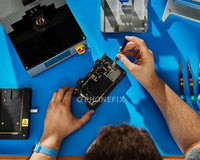In the ever - evolving realm of automotive technology, car chips, or integrated circuits (ICs), have become the unsung heroes that power the modern driving experience. As cars transform from simple mechanical contraptions to sophisticated smart devices on wheels, many different vehicle functions are powered and controlled by these tiny but powerful chips. These functions range from simple tasks to complex safety features.
Car repair chips are specifically designed to address issues during vehicle maintenance and repair. For example, some chips are used to diagnose problems in the vehicle's electrical systems. They can communicate with the various control units in the car and retrieve error codes, which technicians can then use to identify the root cause of malfunctions. There are numerous types of integrated circuits used in cars, including but not limited to:
Powertrain - Controlling the Heart of the Car.
Powertrain chips are crucial for the efficient operation of a vehicle's engine, transmission, and other key components. Engine Control Unit (ECU) chips, a prime example, are responsible for regulating engine functions such as fuel injection, ignition timing, and air - fuel ratio. They constantly monitor data from various sensors within the engine, like oxygen sensors that measure the oxygen content in the exhaust gas, and adjust the engine's operation accordingly. This ensures optimal fuel efficiency, performance, and reduced emissions.
Safety System - Guardians of the Road.
Safety system chips are the vigilant protectors that keep us safe on the road. They control vital safety functions such as airbags, brake systems, and collision detection. For instance, airbag control unit chips are designed to rapidly analyze data from sensors located throughout the vehicle in the event of a collision. These sensors detect sudden decelerations, and if the impact meets or exceeds a pre - set threshold, the airbag control unit chip triggers the deployment of airbags within milliseconds, cushioning the occupants from the force of the impact. Anti - lock braking system (ABS) chips work in a similar fashion, constantly monitoring the wheel speed sensors to prevent wheel lock - up during braking, allowing the driver to maintain steering control.
Driving Assistance - Paving the Way to Autonomy.
Driving assistance chips are at the forefront of the shift towards autonomous driving. These chips support functions like autonomous driving, parking assistance, and collision warning. In autonomous driving systems, high - precision sensor chips are essential. Lidar (Light Detection and Ranging) sensor chips, for example, emit laser pulses and measure the time it takes for the light to bounce back from surrounding objects. This data is then processed by complex driving assistance chips to create a detailed 3D map of the vehicle's surroundings. Radar sensor chips, which use radio waves to detect the distance, speed, and angle of objects, also contribute to this perception. Parking assistance chips use ultrasonic sensors to detect the distance between the car and nearby obstacles when parking, making the process much easier for drivers.
In - Vehicle Entertainment and Information System - Connecting the Cabin.
In - vehicle entertainment and information system chips bring the digital world into the car. They are responsible for functions such as in - vehicle navigation, audio systems, and communication equipment. Navigation chips use Global Positioning System (GPS) technology to determine the vehicle's location accurately. They then work in tandem with other chips to provide turn - by - turn directions, traffic information, and even suggest the best routes based on real - time data. Audio system chips manage everything from the sound quality of the music playing through the car's speakers to the volume control and equalizer settings. With the rise of connected cars, communication chips enable features like Bluetooth connectivity for hands - free calling and music streaming, as well as Wi - Fi connectivity for accessing the internet and software updates.
Battery Management - Optimizing Electric Power.
For electric vehicles, battery management chips are of utmost importance. They are used in battery management systems to monitor the charging and discharging status of batteries and ensure safe use. These chips constantly measure parameters such as battery voltage, current, and temperature. By accurately monitoring the state - of - charge (SOC) and state - of - health (SOH) of the battery, battery management chips can prevent overcharging, over - discharging, and overheating. This not only extends the lifespan of the battery but also ensures the safe operation of the vehicle.
Car chips are the building blocks that enable the complex and advanced features we see in modern cars. From ensuring our safety on the road to providing an immersive in - vehicle entertainment experience, these ICs are integral to the automotive industry's continued evolution. As technology advances, we can expect even more sophisticated and powerful car chips to emerge, further transforming the way we drive.
If you want to know more about a specific type of car chip, please visit and subscribe to the China ecufixtool store to get the latest automotive chips in real time.
The World of Car ICs: A Diverse Landscape










